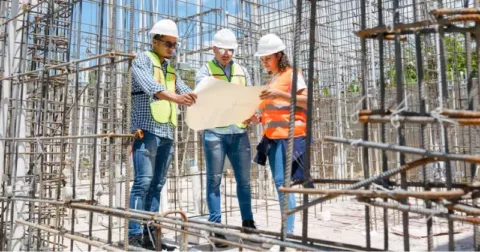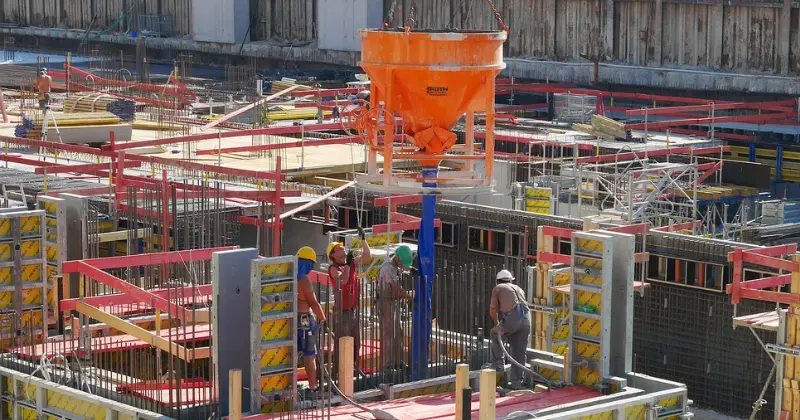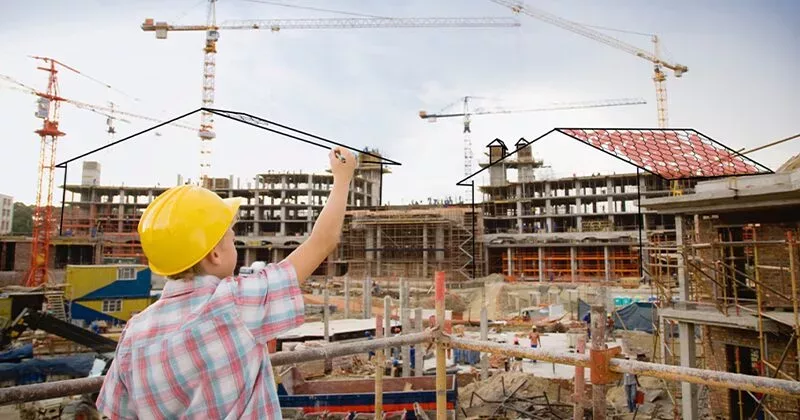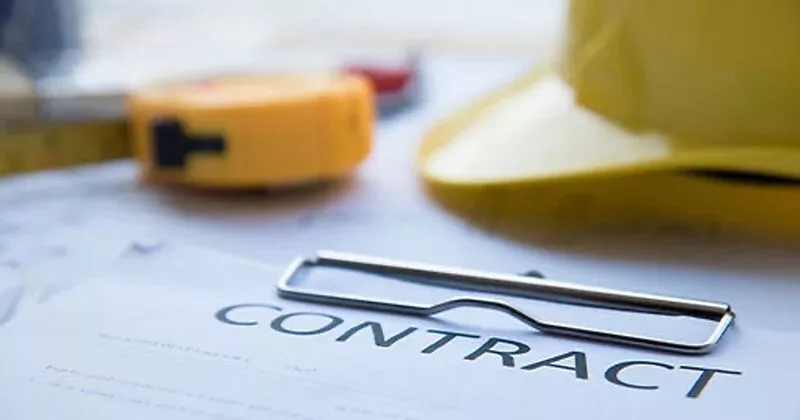10 mins read
Why You Need Clear Communication in Construction

Communication in the building industry is the cornerstone of success. From the start of a project to its final stages, effective communication in construction is not just beneficial but fundamental, as it can determine a project’s success.
Construction involves many elements, including different roles, tasks, and collaborations throughout the project. Clear and effective communication is key to ensuring this all comes together smoothly.
When communication in construction is lacking, it can quickly escalate and cause a myriad of issues. Even minor misunderstandings at the beginning may evolve into major problems as the project progresses. Ultimately, this will lead to mistakes and rework, which can drain valuable resources. That’s why establishing clear, well-defined communication channels and workflows is essential to avoid such setbacks.
Let’s investigate how you can maximize and enhance the communication strategy throughout the construction process.
What is Construction Communication?
Communication in construction is an approach to interpersonal interactions that aims to promote understanding and collaboration between project stakeholders. Good communication ensures the project is completed within time and budget and meets the expected quality.
Construction projects involve a communication chain consisting of architects, engineers, contractors, subcontractors, suppliers, and clients. Each individual has their own unique expertise and responsibilities, and they collaborate with each other to ensure a seamless project completion. However, a lack of clear communication can lead to the breakdown of this collaboration. Therefore, it is essential for the flow of information to be constant throughout the process.
Because of the multitude of processes and tasks involved in making accurate decisions regarding the building process, good communication in the construction industry is essential. This includes everything from the construction architect supplying drawings to a contractor to the final paint coatings being approved for use. An extensive chain of responsibilities must be clearly defined and executed precisely by individuals fulfilling various roles throughout these complex procedures.
With clear communication, all parties involved in a project understand their tasks, obligations, and deadlines clearly. This promotes the free flow of ideas and enables potential problems to be identified early so they can be addressed collaboratively before becoming major issues requiring reactive measures.
Misunderstandings or inaccurate instructions passed along the communication line from contractor to subcontractors, architect to builders, and beyond could result in defective completion of projects, tasks, and activities, significantly affecting construction cost control.
Inadequate communication in construction or inaccurate instructions can also result in costly revisions to remedy errors. This may require additional scheduling and reconstruction efforts, which are both time-consuming and financially taxing. Consequently, the project may experience setbacks due to unnecessary resource allocation to address these blunders. Since profit margins are slender within this industry domain, rework expenses could negatively impact the budget.
Implementing effective communication and collaboration systems at the beginning of a project is essential to prevent exceeding the budget and going over schedule. Teams need to be able to communicate efficiently from the very first planning stage right through to the end. This will not only enhance the construction project management process but will also keep the entire project on track, improving productivity and mitigating possible delay claims.
The Importance of Communication in Construction
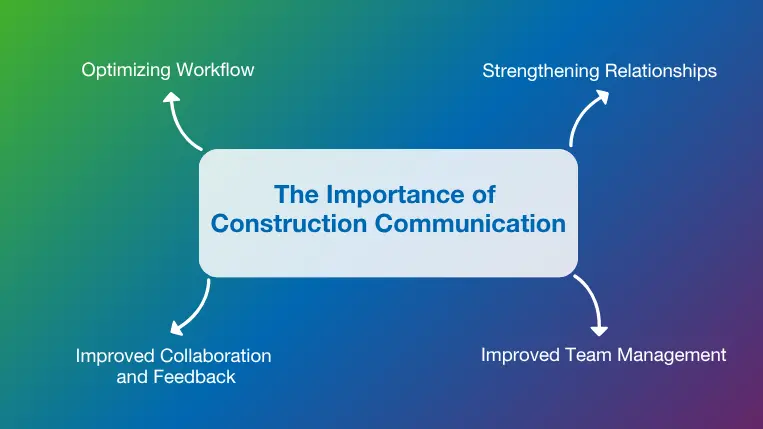
Maintaining a strong communication chain will enhance each stage of the construction lifecycle. Let’s look at a few core reasons why you should focus on a solid construction communication strategy.
Optimizing Workflow
The construction industry is always on a tight schedule, and any delays or miscommunication can cause costly obstacles that impact both the project timeline and budget. To prevent these setbacks, it’s essential to maintain clear communication throughout every phase of development to coordinate efforts toward achieving mutually agreed-upon goals related to deadlines, timing, and deviations from established plans.
By maintaining transparent communication in construction, project managers can identify potential obstacles and allocate resources efficiently, thus ensuring that the project runs smoothly. This is especially important in managing supply chain logistics, scheduling subcontractors, or resolving unforeseen challenges, as open dialogue guarantees seamless operations and efficient construction productivity.
Strengthening Relationships
Communication helps strengthen and build relationships in construction projects. Good relationships are key to any successful business operation, helping to build trust and transparency between all the stakeholders involved. For example, good communication between the project owner and the contractor can prevent costly disputes affecting both parties’ profitability. Likewise, it generates an environment of trust that provides the opportunity for the contractor to be considered for future projects as well. Good relationships between disciplines are also fundamental as they ensure everyone has the proper disposition and a willingness to help and get the work done, resulting in more effective workflows.
Improved Team Management
Effective construction site communication strengthens team management. A good project manager should be able to clearly communicate the desired daily and weekly activities to the team, which helps form a clear roadmap for reaching the desired goals.
Strong communication skills from the site team to management will mean that everybody better understands the status of the project and the direction it needs to take. It will allow management to implement proactive and protective measures instead of corrective measures if anything should happen on site. This is crucial as it leads to more accurate and efficient projects.
The better the communication, the more confident the team becomes. Having a more open and transparent system allows the team to understand exactly what they need to do.
When challenges arise, open communication allows for the sharing of solutions. This means that teams can solve problems quicker, leading to a team that is better equipped for the job and happier to take on the workload.
Improved Collaboration and Feedback
Good communication channels also enhance collaboration in construction and creative innovation. Team members can share ideas and experiences for others to learn from, helping to inspire stronger ideas and better collaboration on finding the best solutions for projects.
Communication leads to feedback. Feedback loops allow you to track performance and understand where there is success, issues, and concerns. Communicating a project’s strengths and weaknesses is one of the best ways to learn, and doing so can improve your strategies and tactics for future projects.
Ultimately, transparency and strong communication result in a better outcome. Sound communication systems best achieve results. They keep everyone involved on the same page, updated, and aware of deadlines and goals.
Challenges of Construction Communication
One of the biggest challenges of construction site communication is the lack of effective communication on the ground. Poor communication can stem from various factors, such as ambiguity, miscommunication, insufficient feedback, lack of up-to-date information, or incorrect assumptions (among others). Language barriers, technical jargon, and even time differences can compound these issues. In addition, vague or inadequate information regarding access, flow, and timing is also a typical complaint.
Another major reason for ineffective communication in construction projects is information silos. This is when information is frequently confined to particular projects, teams, and departments or distributed via different tools. When information becomes isolated like this, it can make it difficult to see the big picture.
Consequences of Poor Communication in Construction
- On-site confusion. One of the most significant problems miscommunication can cause is confusion, which can apply to anyone, from field workers to other construction roles. Inconsistent or incomplete reporting can lead to mistakes, resulting in project delays and cost overruns.
- Project delays. Mistakes in the project can be caused by various factors, including unclear messages, delayed information flow, and communicating with the wrong person. These mistakes can delay processes and, in the worst case, require work to be redone and additional materials to be purchased, resulting in the schedule not being met.
- Overspending and exceeding budgets. Often, miscommunication and poor communication may result in extra and unnecessary expenditure. Because of an issue caused by miscommunication, you would have to spend money and time rectifying the mistake, further delaying the project.
- Safety risks. The construction industry is a high-risk environment, and many opportunities for injuries exist. One of the most common reasons for many job site injuries is poor safety communication: Workers may be unfamiliar with the terminology used for safety training (especially if they are new to the training), which makes it easier for them to disengage. Workers are often afraid to speak up when they discover a safety hazard. They think it’s easier to play it safe, since they fear being criticized for pointing out potential hazards as soon as they discover them.
- Legal disputes: Unclear communication can lead to a disconnect between the expectations of clients and contractors, resulting in costly legal disputes. For example, if a change is agreed upon during a phone call and the contractor goes ahead with the work, without an official, signed change order, the owner might dispute the claim or cost later. Disputes like these delay work, hurt professional relationships, and can lead to significant financial losses.
How to Develop an Effective Construction Communication Plan? Tips & Best Practices
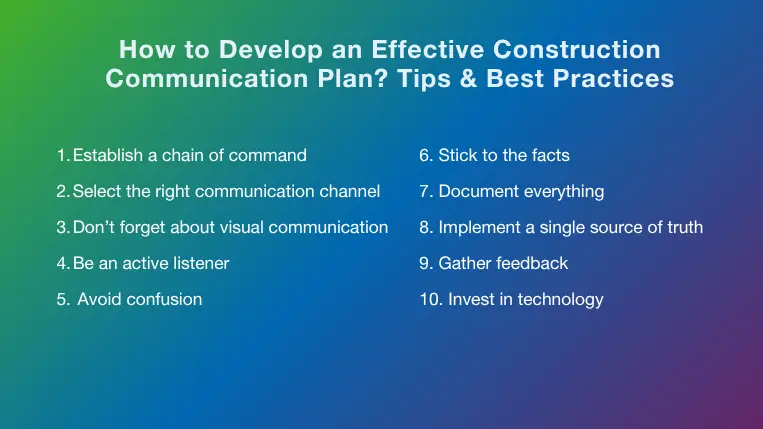
A successful construction communication system must be established at the onset of project planning and estimation. This crucial phase sets the foundation for all that follows. For example, getting feedback from team members on unit rates during this transparent process can lead to more precise cost estimation in construction projects for current and future activities. By implementing reliable technology as part of our systems, we promote open dialogue, which can ultimately increase project value exponentially.
The following points outline how to develop a good communication plan for construction projects:
1. Establish a communication chain of command
Managing a project requires establishing a clear chain of communication. Such channels are usually defined in contractual papers and often mandate that exchanges between the owner and general contractor go through the architect.
The architect’s responsibility is to communicate with the consultants, while the general contractor relays information to suppliers and subcontractors. Usually, a project’s superintendent serves as the primary contact for these contractors.
Establish a clear line of communication that includes identifying points of contact with contact information for key team members. This is vital to ensuring information gets to the right people on time.
Luckily, modern digital construction technologies make communication easier by providing an online environment for all stakeholders to communicate regardless of location.
2. Select the right communication channel for the message
All communication methods have advantages and disadvantages. Years ago, construction professionals had to rely on fax machines to send information from the site to the office. With the introduction of digital technologies like email and Excel, the methods of communication have shifted and have continued to change into what we know today. Choosing the correct method can expedite and simplify the exchange of information. Sometimes, a quick email or phone call will suffice, while in other instances, a meeting may have to be booked for all key personnel on the project. That said, it is also recommended that some official communication channels be established in the contract negotiation stage, such as daily reports or weekly meetings. This will ensure information sharing is established early in the project to ensure efficiency across the project.
3. Don’t forget about visual communication
Expanding on the point above, when thinking about construction communication methods, you should not only consider meetings, reports, or lengthy documents. Visual communication is a powerful tool that can sometimes be more effective than words. In fact, studies suggest that the human brain processes visual content a lot faster than words. This is especially true on construction sites, where people communicate mainly through signs, drawings, and hand signals, key methods for ensuring safety and productivity. Likewise, site professionals take photos to communicate progress to the rest of the teams, supporting communication and effective quality control.
In addition, innovative digital technologies like BIM models boost collaboration and communication through a highly interactive and visually appealing environment. BIM allows teams to interact with the design in a 3D environment with real-time data, making it easier to visualize changes and their impact to anticipate potential risks or issues. It also facilitates more effective design reviews, safety planning, and stakeholder engagement. A good communication plan should integrate visual elements wherever possible to support different learning styles and avoid costly errors due to misinterpretation.
4. Be an active listener
When holding project meetings, the whole point is communicating and ensuring everyone understands their roles and responsibilities. Don’t only ask questions at the appropriate times but also be an active and not a passive listener: Try to understand what the speaker is trying to communicate from their point of view. Make notes on details you might need clarified, make eye contact, and make nonverbal signals like head nods to show that you are actively listening.
5. Avoid confusion
Avoid using jargon or terms that the people you are working with don’t understand. Remember, with communication in the construction industry, you want to ensure that your message is understood the first time you convey it. It’s all about being brief but comprehensive in your communication.
Another aspect that should be considered to avoid confusion is the language barriers that can occur on site and in the office. More and more construction projects are multilingual, with teams made up of workers from different countries and backgrounds. If not considered, these barriers can significantly affect the project due to misunderstandings. Using signage and reports with multiple language options and relying on visual communication are great ways to mitigate the risks.
6. Stick to the facts
As far as possible, you want only to provide or get the facts. Don’t over-elaborate or include other information in your communications. Keep your personal opinions or feelings about a project to yourself, unless asked. If you feel your professional opinion could be valuable to successfully completing a project, it is important to share it. Your company’s expertise is part of what landed you the project, so don’t be afraid to speak up.
7. Document everything
Another invaluable best practice to ensure healthy communication is to document everything. Change is part of any construction project and not documenting it can lead to issues. Therefore, every decision, request, or change should be documented and shared with relevant parties. A successful communication plan establishes rules for how, when, and where project information is recorded and stored, for example, meeting minutes, RFIs, daily logs, or change order forms. This documentation must be as detailed as possible, stating what the change or information is about, who is in charge of it, when it should be completed, and what the requirements are.
8. Implement a single source of truth
Expanding on the point above, together with documenting everything, you should also ensure that there is a single source of truth for all project information. This means construction specifications, change orders, drawings, schedules, and more should all be centralized and easily accessible in a single location. This avoids version control issues or people working with outdated information, reducing the risk of errors and legal disputes that can bring additional costs to the project. Cloud-based construction software offers the perfect environment to centralize documentation, ensuring it is always available and up to date. Plus, the cloud nature of these solutions ensures everyone, regardless of location, can access information when needed.
9. Gather feedback
Gathering feedback is a key part of the continuous improvement mentality coming from lean construction principles. After the project is completed or at the end of key stages, you should gather feedback from field teams, subcontractors, and clients to identify what works and what could be improved in terms of communication. Are the instructions clear? Are meetings effective? Are changes being communicated on time? Having the answer to these questions allows you to adjust based on what’s working and what could be improved. Feedback can be gathered through meetings or even anonymous surveys to encourage people to give honest opinions.
10. Invest in technology
Successful construction communication relies heavily on technology. Investing in the right tools, like project management software, estimating solutions, or mobile apps for field reporting, streamlines communication, reduces response times, and ensures information flows smoothly between the office and site.
We have already mentioned how BIM has become an invaluable technology that boosts communication and collaboration in construction by offering a 3D model of the project, containing real-time information to support data-driven decision-making and cooperation between teams and disciplines. Likewise, professional document management and collaboration software can facilitate communication and optimize processes through some powerful features, including:
- Centralized information: These robust solutions offer a centralized location to manage all project documentation, eliminating version control issues and infinite email threats where communication gets lost. Teams can securely share files, drawings, reports, contracts, and other documents. Information is updated in real-time to ensure everyone works with the latest versions.
- Access controls: Most document management tools will offer access control features to ensure only the right people have access to relevant project information. This provides a level of security, trust, and accountability that can benefit the project and prevent data mismanagement.
- Web-based access: Probably one of the most significant benefits of these solutions is web-based accessibility, which ensures that all stakeholders can access project documentation and data from any internet-enabled device. This is especially beneficial for professionals working from site, as they can access and share critical or time-sensitive information without being at the office.
Conclusion
Communication is the foundation of a fruitful construction project, achieved through cooperation among team members, efficient procedures, risk management, and problem resolution. To thrive in an ever-changing industry environment where progress and superiority are relentlessly sought after, using pioneering technology and optimal methods becomes crucial for sustaining communication as the catalyst for innovation.
The value of innovative construction software such as RIB CanBuild should also never be underestimated. These platforms can streamline your business and communication channels, fostering collaboration and reducing errors. Ready to build better with RIB? Get your free demo today!
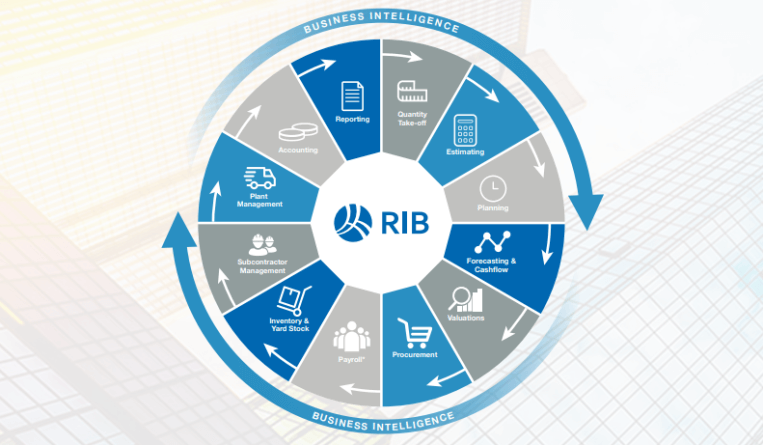
Most Recent
10 mins read
29 mins read
27 mins read
24 mins read
Blog Categories
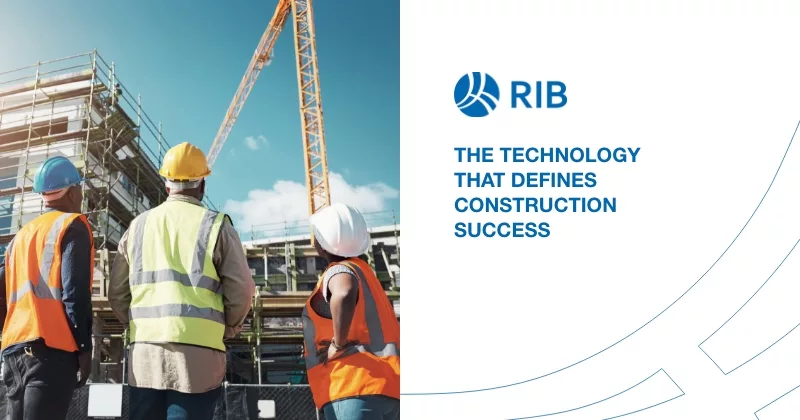
Ebook
